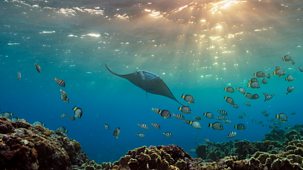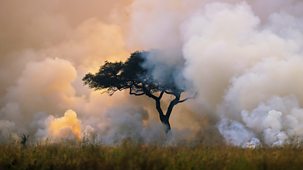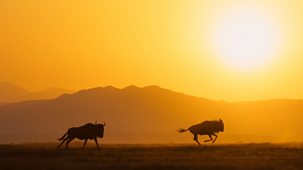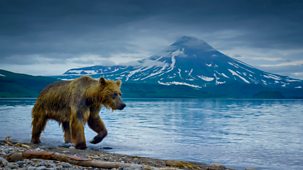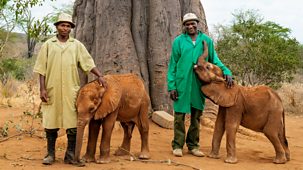
Series 1: 5. Humans
Earth is the only living world we know of, but a new force threatens our perfect planet. That force is us. Humans are changing our planet so rapidly, it’s affecting earth’s life support systems: our weather, our oceans and the living world. To understand what is going wrong, we must look to the past. \n\nEarth has been through at least five mass extinction events, most of which have been caused by cataclysmic volcanic eruptions. It’s not the lava or ash that wiped out life, but an invisible gas released by volcanoes: carbon dioxide. \n\nThrough compelling animal-led stories and expert interviews, we discover how CO2 is destabilising our planet. We meet rescued orphaned elephants in Kenya, victims of ever worsening droughts, and join ocean patrols off the coast of Gabon fighting to save endangered sharks. In the Amazon, we witness wildlife teams saving animals in the shrinking forests, and in San Diego we enter a cryogenic zoo preserving the DNA of endangered species before they become extinct. \n\nAlmost every part of modern life depends on energy created by burning fossil fuels, and this produces CO2 in huge amounts. Humans are now acting like a super-volcano, releasing carbon dioxide at an even greater rate than the prehistoric mega-eruptions that extinguished life in the past. Globally, we now release 100 times more carbon dioxide into the atmosphere than all of Earth's volcanoes combined.\n\nThe greatest change to be made is in how we create energy, and the planet is brimming with natural power that can help us do just that. It’s these forces of nature - the wind, the sun, waves and geothermal energy - that hold the key to our future.
Source: BBC 1
Most recent episodes of A Perfect Planet
A Perfect Planet
Series 1: 5. Humans
Earth is the only living world we know of, but a new force threatens our perfect planet. That force is us. Humans are changing our planet so rapidly, it’s affecting earth& ...
01-04-2024
BBC 1
A Perfect Planet
Series 1: 4. Oceans
Oceans are the largest ecosystem on earth, covering two thirds of our world’s surface and providing half the oxygen in our atmosphere. They are home to as much as 80 per c ...
24-03-2024
BBC 1
A Perfect Planet
Series 1: 3. Weather
Weather controls the distribution of freshwater on Earth, which in turn shapes the lives of animals in diverse habitats around the globe.
17-03-2024
BBC 1
A Perfect Planet
Series 1: 2. The Sun
From the frozen poles to the searing deserts, this episode shows how animals have come up with strategies to survive the uneven amounts of sunlight that fall on our planet.
10-03-2024
BBC 1
A Perfect Planet
Series 1: 1. Volcano
A look at how without volcanoes, there would be no life on Earth. Although destructive, magma from the planet’s molten core builds land, and mineral-rich ash from eruption ...
03-03-2024
BBC 1
Most popular episodes of A Perfect Planet
A Perfect Planet
Series 1: 3. Weather
Weather controls the distribution of freshwater on Earth, which in turn shapes the lives of animals in diverse habitats around the globe.
17-03-2024
BBC 1
A Perfect Planet
Series 1: 2. The Sun
From the frozen poles to the searing deserts, this episode shows how animals have come up with strategies to survive the uneven amounts of sunlight that fall on our planet.
10-03-2024
BBC 1
A Perfect Planet
Series 1: 1. Volcano
A look at how without volcanoes, there would be no life on Earth. Although destructive, magma from the planet’s molten core builds land, and mineral-rich ash from eruption ...
03-03-2024
BBC 1
A Perfect Planet
Series 1: 4. Oceans
Oceans are the largest ecosystem on earth, covering two thirds of our world’s surface and providing half the oxygen in our atmosphere. They are home to as much as 80 per c ...
24-03-2024
BBC 1
A Perfect Planet
Series 1: 5. Humans
Earth is the only living world we know of, but a new force threatens our perfect planet. That force is us. Humans are changing our planet so rapidly, it’s affecting earth& ...
01-04-2024
BBC 1


